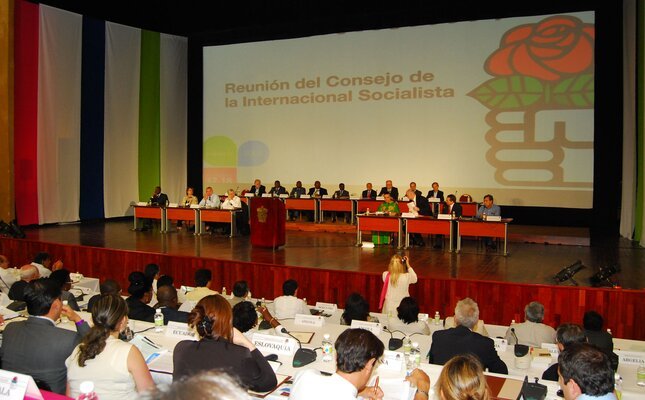Members of the Socialist International Council from all continents convened in Mexico on Monday 17 and Tuesday 18 November, hosted by the organisation’s two member parties in that country, the Institutional Revolutionary Party, PRI, and the Party of Democratic Revolution, PRD, to discuss an agenda under the main theme of “A Global Social Democratic Response to the World Financial Crisis”. Participants, including current and former heads of government, ministers, party leaders and representatives, brought to the discussions regional and national perspectives to put forward common social democratic proposals for tackling the global financial and economic crises.
Meeting on a University campus in Vallarta, with close to 200 delegates, the Council opened on Monday 17 November with words of welcome from the Director of the Institute of Innovation and Governance of the University of Guadalajara, and speeches by Guadalupe Acosta Naranjo, President of the PRD; Beatriz Paredes, President of the PRI and an SI Vice-President; and by the President of the Socialist International, George Papandreou.
High on the Council agenda were the critical role of politics, government and regulation to secure a sustainable and fair global economy, as well as the changing international situation, following the election of Barack Obama in the United States and the new scenario for world politics, and opportunities for international cooperation and multilateralism.
Building on discussions initiated by the Socialist International Presidium at its meeting, held at the United Nations in New York, and the recently established SI Commission on Global Financial Issues, the Council highlighted the need for a comprehensive approach to the crisis, one which addressed not only the financial aspect but also dealt with climate change, environmental and energy issues, as well as fighting poverty. The SI Council underlined that new responsibilities and opportunities had opened up for the global social democratic movement to place its concerns at the heart of the agenda of a new economic paradigm – with an emphasis on jobs, pensions, health, education and democratic governance. A return to politics was essential, the Council asserted, and gave specific proposals for a new financial architecture based on social democratic principles in a Statement adopted at the conclusion of the debates.
The Council also heard examples of innovative approaches and best practices for social inclusion policies in different parts of the world, especially among emerging and developing countries, in a special panel debate. Particular cases were presented, including policies for migrant workers both at home and abroad introduced in Zacatecas, Mexico; on social development projects being carried out in Guatemala; on job creation policies undertaken in Angola; on social inclusion programmes for indigenous peoples established in Peru and on the need for democratic development in Equatorial Guinea. There also followed a discussion on the need to address inequality and enhance regional cooperation, which included a perspective from Latin America and the Caribbean.
At this first Council following the XXIII Congress, the Socialist International, in accordance with its Statutes, established a number of regional and thematic Committees which will be active in this forthcoming period, as well as electing their respective Chairs. Regional committees were re-established for Africa; Asia and the Pacific; the CIS, Caucasus and the Black Sea; Latin America and the Caribbean; the Mediterranean; the Middle East; and South Eastern Europe, with thematic Committees created to address the following issues: Economic Policy, Labour and National Resources; Social Cohesion, Poverty and HIV/AIDS; Disarmament; Local Authorities; Migrations; and Peace. The members of the SI Finance and Administration Committee and the organisation’s Ethics Committee were also elected for this inter-Congress period.
Speakers, Participants
Other councils
Santo Domingo, 28-29 January 2019
Geneva, 26-27 June 2018
Barcelona, Spain, 24-25 November 2017
New York, 11-12 July 2017
Cartagena*, 2-4 March 2017
Geneva, 01-02 July 2016
Luanda, Angola, 27-28 November 2015
New York, 06-07 July 2015
Geneva, 12-13 December 2014
Mexico City, 30 June - 1 July 2014
Istanbul, 11-12 November 2013
Cascais, Portugal, 4-5 February 2013
Cape Town*, 30 August - 1 September 2012
San José, Costa Rica, 23-24 January 2012
Athens, 1-2 July 2011
Paris, 15-16 November 2010
New York, 21-22 June 2010
Santo Domingo, 23-24 November 2009
Montenegro, 29-30 June 2009
Vallarta, 17-18 November 2008
Athens*, 20 June - 2 July 2008
Geneva, 29-30 June 2007
Santiago, 6-7 November 2006
Athens, 30-31 January 2006
Tel Aviv and Ramallah, 23-24 May 2005
Johannesburg, 15-16 November 2004
Madrid, 7-8 February 2004
São Paulo*, 26 October 2003
Rome, 20-21 January 2003
Casablanca, 31 May - 1 June 2002
Santo Domingo, 26-27 November 2001
Lisbon, 29-30 June 2001
Maputo, 10-11 November 2000
Brussels, 10-11 April 2000
Paris* 7 November 1999
Buenos Aires, 25-26 June 1999
Geneva, 23-24 November 1998
Oslo, 18-19 May 1998
New Delhi, 10-11 November 1997
Rome, 21-22 January 1997
New York*, 8 September 1996
Brussels, 7-8 December 1995
Cape Town, 10-11 July 1995
Budapest, 2-3 December 1994
Tokyo, 10-11 May 1994
Lisbon, 6-7 October 1993
Athens, 9-10 February 1993
Berlin*, 15-17 September 1992
Santiago, 26-27 November 1991
Istanbul, 11-12 June 1991
New York, 8-9 October 1990
Cairo, 22-23 May 1990
Geneva, 23-24 November 1989
Stockholm*, 20-22 June 1989
Madrid, 11-12 May 1988
Dakar, 15-16 October 1987
Rome, 8-9 April 1987
*On the eve of the Congress

